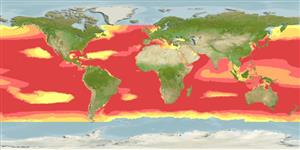Preferred temperature (Ref.
115969): 5.5 - 21.3, mean 11.3 (based on 2694 cells).
Índice de diversidade filogenética (Ref.
82804): PD
50 = 0.5078 [Uniqueness, from 0.5 = low to 2.0 = high].
Bayesian length-weight: a=0.01698 (0.00984 - 0.02932), b=3.11 (2.96 - 3.26), in cm Total Length, based on LWR estimates for this species & Genus-body shape (Ref.
93245).
Nível Trófico (Ref.
69278): 3.1 ±0.14 se; based on food items.
Resiliência (Ref.
120179): Elevada, tempo mínimo de duplicação da população menor que 15 meses (tm=1; tmax=1).
Fishing Vulnerability (Ref.
59153): Low vulnerability (10 of 100).
